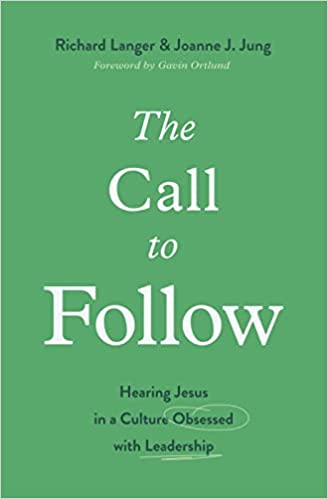
Talbot School of Theology professors Rick Langer and Joanne J. Jung are authors of the new book The Call to Follow: Hearing Jesus in a Culture Obsessed with Leadership. Join Good Book Blog on a series of four posts written by Langer and Jung on the call to follow. Below is the first post in the series.
“I’m writing a book on followership?”
“You are writing a book on what???”
We can hardly count the number of times each of us have had this conversation in the past two years. The usual follow up question is, “Why would you do that?” The answer, of course, is that the reason we wrote this book is exactly because people asked that question! It seems inconceivable to people that there is anything about being a follower that is worth writing a book about. Our culture, both secular and sacred, has almost no imagination for following being a significant and meaningful human calling.
Therefore, we are not expecting to see our book in an airport kiosk anytime soon. Oprah’s book club will probably not be calling. If we didn’t have good day jobs, we would probably have had to write a book on leadership. But frankly, we think our culture is in much more need of a book on followership.
Don’t get us wrong, we are not opposed to leadership. In fact, good leadership is greatly needed. Kind of like money. Money is not bad — in fact, quite the opposite. It is a blessing both to ourselves and to others. It makes possible a whole host of economic activities that would be impossible in a barter economy. In so doing, money also makes for economic growth that would be impossible without it and thereby contributes greatly to prosperity and human flourishing.
Unfortunately, money is also seductive, deceptive and dangerous to our souls. It is an instrumental good, meaning that it is good for the sake of other goods, not good in and of itself. But we often pursue money as if its goodness was intrinsic — as if it was to be desired for its own sake. Money is good within bounds; Proverbs encourages us to pray that God would give us “neither poverty nor riches” (Prov. 30:8).
But we often pursue money as if it was a boundless good — as if it was good in any measure and more was always better. Money has a proper place in our wallets, but it often wants to steal a place in our hearts, becoming an idol by occupying a place that should properly be reserved for God. Money sneaks into our affections, guides our choices, serves as the altar for our most extreme sacrifices, and ultimately tunes its voice to the key of final judgment, whispering, “Well done, thou good and faithful servant.” Money is equal parts good and downright scary.
Leadership, too, is an instrumental good. It helps get things done. But it is not an intrinsic good — it is not to be pursued for its own sake. We should aspire to serve and love and care for others — and fulfilling those aspirations may require us to lead — but leadership often becomes its own aspiration. We find successful leadership to be satisfying, so we seek to climb the ladder. As with money, we think that if a little bit satisfies, more of it will bring even greater satisfaction. So, we are not anti-leadership, we’re just pro-followership.
Leadership is important, but the church has mirrored our culture in recent decades by over-emphasizing leading and neglecting following. We challenge people to lead, we train and equip them to lead, and we celebrate and praise them for leading (or condemn them as the case may be). Followership, in contrast, is almost completely ignored. We talk about a call to leadership; we almost never talk about a person who is called to followership. We have little or no imagination for the gifts or skills of followership. We usually think of followership as simply the failure to lead. Followership is like a shadow, it is a nothing rather than a something, an absence rather than a presence.
But biblically, we believe followership is an invaluable something in its own right. It has its own set of skills and excellencies; it has its own challenges and rewards. Followership is an end in itself. Especially for Christians, in fact, followership is more foundational to our spiritual life than is leadership. We may move in and out of leadership; there is never a day when we will not be followers. We are disciples of Christ, a term that means followers. We have no higher aspiration than to follow the author and perfecter of our faith.
We started thinking about a book on following because we felt it was sorely neglected. We wanted to offer a corrective to the unhealthy belief that if you’re not a leader, you are immature, you’ve missed your calling, you have neglected your dormant gift of leadership, or that so little is required of a follower, there is no need to train or equip you. We disagree with all these beliefs about followership. So, this is the first of a short series of blog posts that will hopefully stimulate your curiosity to read a little more and rediscover the lost art of faithful following!
Listen to Scott Rae and Sean McDowell interview author Rick Langer about The Call to Follow on the Think Biblically podcast.
 Biola University
Biola University.jpg)




.jpg)
.jpg)